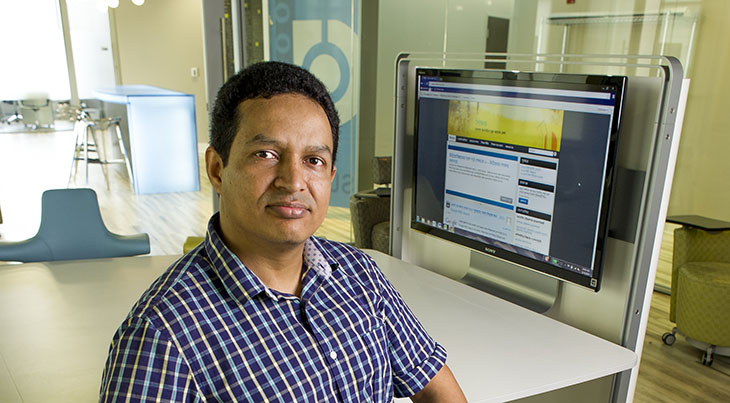
Education Anywhere
Online Courses Built for the Realities of the Developing World
By Javacia Harris BowserThe Internet has opened up a world of educational opportunity for billions of people. But you need more than a web browser to take advantage of the Information Revolution.
“Systems have been built to provide online education, but they’re all in English,” says Ragib Hasan, Ph.D. (pictured above), an assistant professor in UAB’s Department of Computer and Information Sciences. So Hasan, who runs the SECuRE and Trustworthy Computing Lab (SECRETLab) at UAB, decided to create a free course in computer security entirely in Bengali, the language of his native Bangladesh and parts of northern India.
Hasan launched his course in August 2012. Students soon started to write in, letting him know how much they appreciated his efforts. “One of them said he had always wanted to study computer science, but he was born in a very poor family, and he didn’t have the money to go to college,” Hasan says. “My course actually gave him the opportunity.”
A School in the Clouds
Buoyed by the response, Hasan decided to aim higher. He registered a website, Shikkhok.com—named after the Bengali word for “teacher”—and solicited help from expert volunteers. Shikkhok now offers classes in mathematics, biology, statistics, photography, culinary arts, and more, “from the middle school level all the way to graduate-level courses,” Hasan says.
Students can access the lectures in a variety of ways, Hasan explains. While there are few laptops or desktop computers in rural areas, “most people have mobile phones,” he says. “Even the cheap mobile phones can play short video or audio files,” and the Shikkhok content is tailored to these limitations, he notes.
There are also mobile phone shops and kiosks in the marketplaces of many villages where residents can go to download music videos or albums to their phones. Hasan has worked to have the Shikkhok lectures available for download at these shops.
As of February 2014, Shikkhok.com had 55,000 registered users and a catalog of 50 courses; its lectures have been viewed more than 2.75 million times. Because registration is optional, the actual number of students using the course material is most likely much higher, Hasan says.
His costs are remarkably low: $5 per year for the website domain name and $10 per year for web hosting. Hasan uses free online resources to create quizzes and an automated test scoring system.
Pi in the Sky
Hasan has also developed Shikkhok Educational Kits, based on the open-source Raspberry Pi, a credit card-sized computer that can be plugged into a TV and a keyboard. By loading course content onto a memory card, which is then inserted in the Raspberry Pi, students can access classes even if they can’t reach the Internet. The Shikkhok kits could be especially helpful for middle schools that lack science teachers, Hasan says. Each kit costs around $35 to produce.
For his work with the Shikkhok project, Hasan won a $5,000 Google RISE Award in February 2013 and a $3,000 award from the Information Society Innovation Fund in July 2013. These awards are designed to support organizations that promote access to computer science education. Hasan says he is using the money from the awards to fund the creation of more Shikkhok Educational Kits. Part of that funding will also be used in a pilot project to develop digital study materials for a rural school district in Bangladesh.
Hasan hopes to see more efforts to bring the benefits of online education to developing countries around the world. “But if you want to reach out to these students, you have to build content that is in their language,” he says. “It should be localized to that culture so that they can relate to what’s being taught.”
See ChangeIn summer 2013, Ragib Hasan used social media to help a particularly disadvantaged group in Bangladesh. When the school year began, the country’s government had promised Braille textbooks to visually impaired students. But when Hasan saw a news report that many of the textbooks had never arrived, six months into the school year, he took to Facebook to organize a solution. He posted a call for volunteers willing to type out the textbooks page by page and convert them into the format needed to print them in Braille. Within a few hours he had hundreds of people willing to take on the task, with more volunteering to record audio versions of the textbooks. As of September 2013, Hasan’s new project, BanglaBraille, had digitized more than 45 textbooks and produced 40 audiobooks. The project, which can be found online at banglabraille.org, currently has some 2,700 volunteers. |